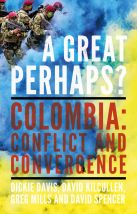A Great Perhaps? Colombia: Conflict and Convergence

This publication draws on several years of fieldwork to provide readers with potential lessons from Colombia’s history of conflict and convergence, as well as the continued military and diplomatic efforts. This includes explanations of the critical roles of leadership, ownership, commitment and conflict entrepreneurialism.
With the latter concept, the authors provide one of their main arguments, stating that key FARC commanders seek to perpetuate the conflict for personal gain. While stating that the ongoing progress is remarkable, they do not consider it sufficient to achieve a sustainable transformation of Latin America’s oldest democracy, which at the same time has the longest history of civil war.
Obviously, the publication is very timely. The authors elaborate why Colombia is currently entering a “new phase of struggle, a political war in which fresh challenges will emerge. Should a peace settlement be achieved, there is every likelihood that FARC will continue its efforts to seize power under another guise, perhaps applying a combination of subversion and open political agitation along with episodic or criminal violence” (page 15).
The book includes an in-depth analysis of the history of the conflict starting with La Violencia. It also describes how FARC has evolved organizationally and in its activities, and it describes the long-term efforts of several Colombian governments aimed at tackling the nexus of the insurgency, drug trafficking and paramilitary. This is explored alongside results from other conflict zones, as Chapter 6 compares the Colombian conflict to those in Malaya, Algeria and Vietnam.
The authors particularly highlight the role of the marginalized and excluded populations, and discusses how territorial logic linked to a weak government in the vast rural zones of Colombia is key to the root causes of the conflict and how it is perpetuated. They also see the necessity for increasing synergies among integrated tactical, operational and strategic effects to achieve a genuine social transformation into a more inclusive society with political and economic opportunities across all governance levels. Improved security (to achieve democratic values, social cohesion and investment promotion), political will, technical capability and good budgetary management are amongst the crucial factors in understanding the gradual economic growth and success that Colombia has seen since the early 2000s.
So while generally acknowledging successes and the progress made in the past 15 years, this book encourages readers to be highly cautious of the peace deal, whose details will determine if historical patterns will repeat themselves and poor outcomes will set the scene for new rounds of conflict.
Book note prepared by Julia Wesely
Search the Book notes database
Our Book notes database contains details and summaries of all the publications included in Book notes since 1993 - with details on how to obtain/download.
Use the search form above, or visit the Book notes landing page for more options and latest content.
For a searchable database for papers in Environment and Urbanization, go to http://eau.sagepub.com/

